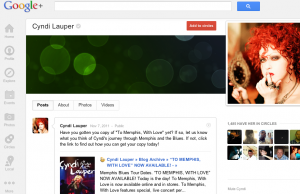Marketers Just Wanna Have Fun – #Inbound2012
Hubspot recently staged their annual Inbound Marketing conference in Boston and it was brimming with talented guest speakers. If you are old enough to actually remember the 80s, you might be excited to learn that Cyndi Lauper was the special musical guest. She happens to be an advocate for SEO and inbound marketing. Guess Internet Marketers just wanna have have fun, too.
What Did We Learn About Inbound Marketing?
There were several high profile keynote speakers including David Meerman Scott, Susan Cain and Gary Vaynerchuk. My personal SEO hero happened to be there, too. Rand Fishkin is the CEO and co-founder of SEOmoz in Seattle and author of the Art of SEO, one of the best books I have read about Internet marketing. Rand’s presentation theme was throwing out old, irrational SEO biases, which he likened to online dating.
Let me explain.
His example was to show data where the majority of women excluded any potential mate who was under 5′ 9″. This irrational bias prevented dozens of other positive attributes these men had, from coming into play. As SEO has established many maxims over the years, what we think should be best practice, does not always equate to actual success online.
Here were some of Rand’s top irrational biases, which SEO practioners and their clients should be thinking about:
Bias: “Ranking Positions are all that matter”
Bias: “Link Building is required for SEO”
We all know that chasing our competitors’ inbound links can be tedious and difficult. Have you thought about building your own links that are just as valuable? By building the relationships in the first place, you are more likely to get the kind of relevant and authoritative link that your competitor cannot buy either. A link that is good for a competitor actually might not do you as much good as them because of the relationship between that competitor’s content and the linking site.
We’ve heard that spending money on acquiring links skirts dangerously close to black hat SEO, but spending money in a different way on relationship building, can earn you those links. Examples include sponsoring local events, being involved in your industry as contributing authors or staging a launch party for a new product. Newsworthy events can earn a good link from a local or national newspaper, so don’t forget about the old fashioned press release to keep journalists in the loop.
Bias: “Only Facebook and Twitter matter”
Google+ is still trying to win over fans, but the fact of the matter is that it can earn as much traffic as Twitter and Facebook, and potentially better engagement. Google + also enables you to get your contributing author profile image into search results as Rand’s example above shows. You’ve heard about putting a name to a face, so ask yourself if you are more inclined to click on a search result link with a smiling face?
Do sites rank better if they have a Google+ account set up? The answer is probably yes. If your ‘circle’ of Google+ friends grows and you become an influencer, then there is every chance Google’s search engine algorithm is picking up on this social signal. What Facebook and Twitter do not offer, is an equivalent amount of content to add to your profile, so this is something that you can take advantage of.
If you want to hear more about Rand’s presentation and other Inbound 2012 presenters, leave a comment or connect on social media!


